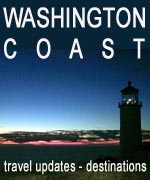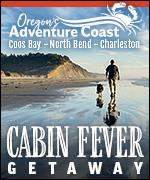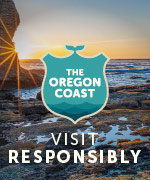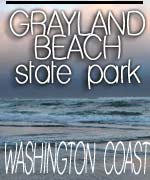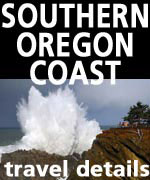Above Oregon / Washington Coast in May: Meteors Peak, Galaxy Disappears - and Maybe a Nova
Published 05/04/25 at 7:25 a.m.
By Oregon Coast Beach Connection Staff
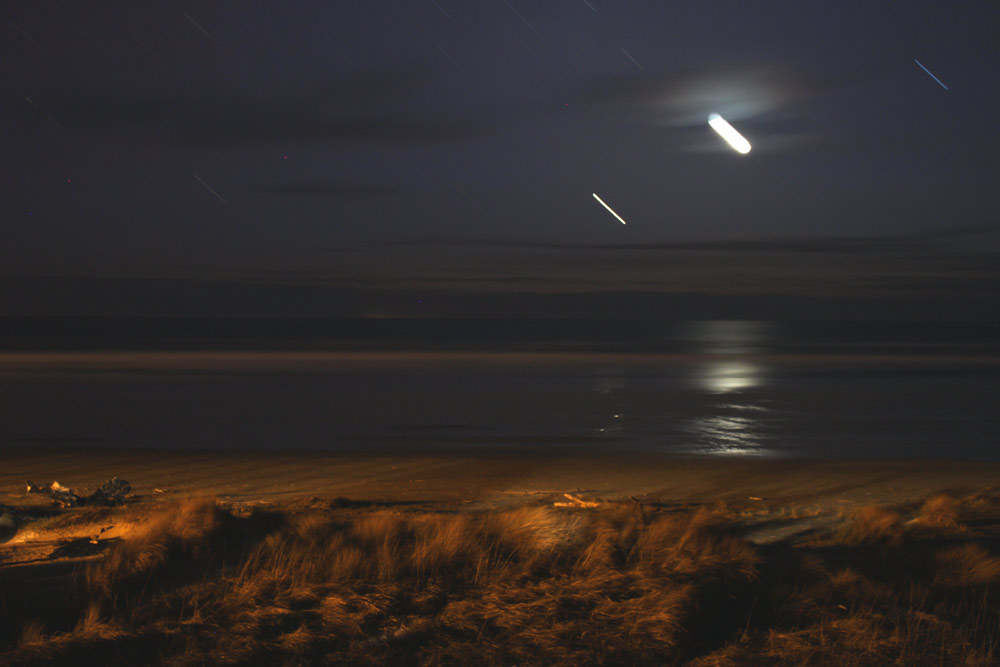
(Astoria, Oregon) – Meteor showers, some planetary action, the rest of the galaxy goes missing, and maybe even a nova. Sounds like an episode of something sci-fi? Nope. This is actually what's happening in May in skies above the Earth – as well as the Pacific Northwest. (Above: Manzanita with movement of the moon and bright stars / Oregon Coast Beach Connection)
Includes exclusive listings; some specials in winter
In Cannon Beach:
Includes rentals not listed anywhere else
In Manzanita, Wheeler, Rockaway Beach:
Some specials for winter
In Pacific City, Oceanside:
Some specials for winter
In Lincoln City:
Some specials for winter
In Depoe Bay, Gleneden Beach:
Some specials for winter
In Newport:
Look for some specials
In Waldport
Some specials for winter
In Yachats, Florence
Some specials for winter
Southern Oregon Coast Hotels / Lodgings
Reedsport to Brookings, places to stay; winter deals
If skies are clear on the Oregon coast or Washington coastline, you could well get an eyeful after dark.
The Eta Aquarid meteor showers peak this week, according to NASA. May 5 and 6 (and three days either side) are when you may see the most of them, perhaps 10 to 20 per hour. The moon is getting in the way a little, so true nighthawks are going to have a better shot with the moon setting around 3 a.m.
“Seeing 10-20 meteors per hour is common for the Northern Hemisphere,” NASA said in a press release.
How to see these meteors? It's not unlike trying to catch sight of whales on the Oregon coast: stare out into the void and bring your patience. Also like whale watching, you'll want to be somewhere outside of the city, although some dark urban spots may work to some degree.
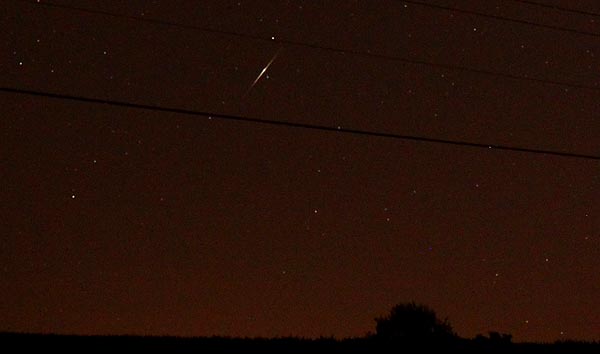
Oregon Coast Beach Connection photo: meteor in the Coast Range
As a sidenote: Oregon Coast Beach Connection has not seen any – and we've been watching the skies. There have been a lot of satellite and ISS sightings, however.
There will be some other bright spots in the skies throughout May, which you'll easily notice above the ocean at areas like Port Orford, Bandon, Seaside, Westport or Lincoln City.
“The planets to look for on May evenings are Mars and Jupiter,” NASA said. “They're visible for a couple of hours after sunset in the western sky.”
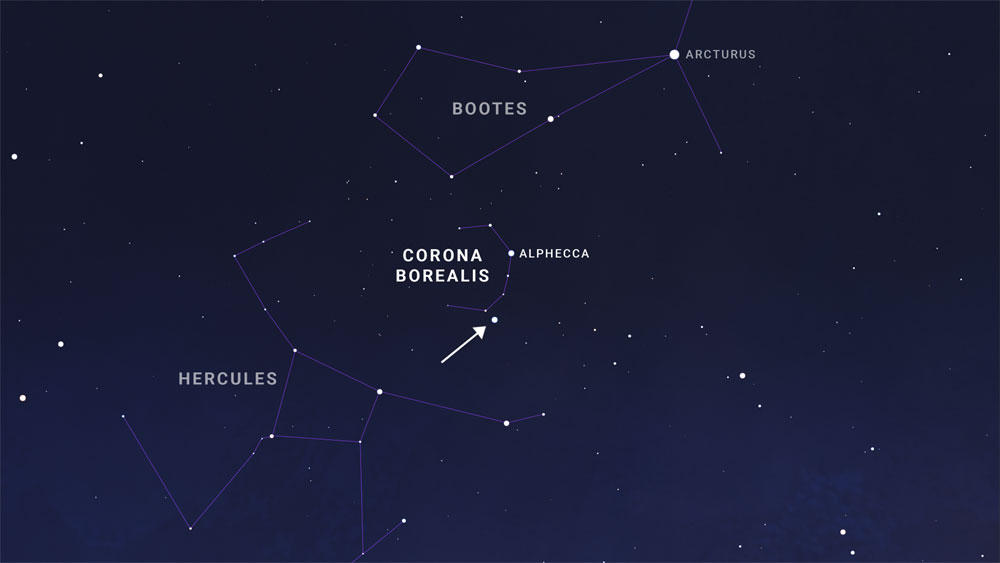
Courtesy NASA
Then, for the coups de gras – at least for some exoplanets out there - we may finally get to see a star explode. It's going to take place in the Corona Borealis constellation in the eastern part of the sky, as one star in a binary system explodes with immense force. A nova is what that's called (not quite a supernova), and scientists have been expecting it any day now for months.
“Some 3,000 light years away is a binary star system called T Coronae Borealis, or 'T CrB.' It consists of a red giant star with a smaller white dwarf star orbiting closely around it,” NASA said. “Now the giant’s outer atmosphere is all puffed up, and the dwarf star is close enough that its gravity continually captures some of the giant’s hydrogen. About every 80 years, the white dwarf has accumulated so much of the other star’s hydrogen, that it ignites a thermonuclear explosion.”
It will only flare in brightness for a few days, and it may not happen for months. Of course, Oregon and Washington spots like Tacoma, Ashland, Newport or Manzanita are dependent on clear skies.
The last one was in 1946.
Oregon Coast Hotels for this event - South Coast Hotels - Oregon Coast Vacation Rentals - Where to eat - Maps - Virtual Tours
If you're anywhere in the Northwest – especially Oregon's famed Dark Sky areas – you may notice the galaxy is missing. The Milky Way vanishes from the night skies in May, according to OMSI astronomy expert Jim Todd in Portland.
“On May evenings, the disk of our Milky Way galaxy lies flat, nearly parallel to the plane of your horizon,” Todd said.
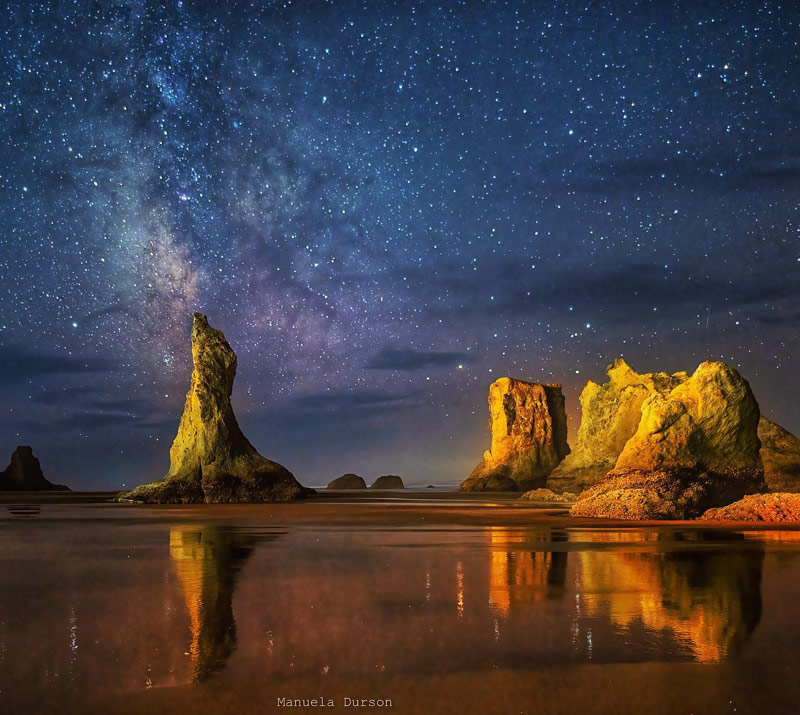
Bandon and the galaxy - photo Manuela Durson - Manuela Durson Fine Arts
This is part of what is called the “galactic plane:” most of the mass of the gigantic disk-shaped object lies there. It disappears as it circles the horizon in May – or at least it appears to do so for us.
In reality, it's Earth moving around.
SEE - Washington Coast Weather - Oregon Coast Weather - Inland Oregon Weather
“As seen from the North Galactic Pole, the Sun and the solar system revolve clockwise around the center or nucleus of the Milky Way Galaxy,” Todd said.
Those photographing Washington or Oregon coastlines at night will get a slightly different view than usual.
Oregon Coast Vacation Rentals
Oregon Coast Lodging Specials
More About Oregon Coast hotels, lodging.....
More About Oregon Coast Restaurants, Dining.....
 Andre' GW Hagestedt is editor, owner and primary photographer / videographer of Oregon Coast Beach Connection, an online publication that sees over 1 million pageviews per month. He is also author of several books about the coast.
Andre' GW Hagestedt is editor, owner and primary photographer / videographer of Oregon Coast Beach Connection, an online publication that sees over 1 million pageviews per month. He is also author of several books about the coast.
Washington Coast / Oregon Coast Articles (stories are random, hit reload to see different articles)
Gearhart, Oregon Weather - 7-Day Forecast, Live Conditions, Wave Height, Tide...Live weather conditions, cams, tides and forecasts for Gearhart, Oregon
Oceanfront Kitchettes in Seaside, Near Gearhart, Near Cannon Beach
Large rooms right up against the surf and Promenade. Watch for whales as you prepare a meal. Seaside reviews, hotel reviews, specials
Ethereal Visitor to Astoria: What Is A Fogbow, and How to Find it on Oregon /...
What is a fogbow, really - where and how you might find it. Weather
Yachats' Little Log Church the Center of Renewal Ceremonies on Oregon Coast
30th annual Valentine?s Day Celebration of Renewal and Commitment on Saturday, Feb. 14. Yachats events, Florence events, Waldport events, Newport
Confirmed Funnel Cloud on Oregon Coast Wednesday, Photographed Over Cannon Beach
The briefly-formed twister apparently never touched down. Weather
Flood Advisories, Warnings, Watches All Over Washington / Oregon Coast
Advisories, watches and warnings in various areas except the central Oregon coast. Weather, traffic
S. Oregon Coast's Paradise Point Back Open After Salvage Effort of Grounded Ship
State park at Port Orford was closed for more than a week
N. Oregon Coast's Highway 6 Back Open to Two Lanes After Month-Long Traffic I...
Road is repaved and both lanes to and from Tillamook are open
Back to Oregon Coast
Contact Advertise on Oregon Coast Beach Connection
All Content, unless otherwise attributed, copyright © Oregon Coast Beach Connection. Unauthorized use or publication is not permitted





